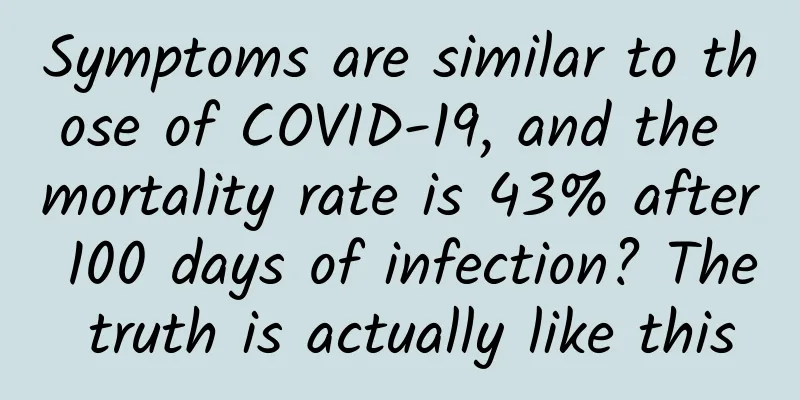Symptoms are similar to those of COVID-19, and the mortality rate is 43% after 100 days of infection? The truth is actually like this

|
The latest data from the Centers for Disease Control and Prevention show that human metapneumovirus (HMPV) is wreaking havoc in the U.S., especially in intensive care units and pediatric hospitals. Because HMPV is virtually unknown, many people keep getting negative results when they have symptoms, a phenomenon that may be related to the spread of the virus. HMPV is the second leading cause of respiratory infections in children and immunity to the virus is weak or incomplete, yet there are currently no vaccines or drugs available worldwide to prevent or treat this respiratory infection. According to data from the CDC's Respiratory Virus Surveillance System, the number of HMPV infections increased significantly this spring, causing hospital intensive care units across the country to be filled with vulnerable young children and elderly people. Dr. John Williams, an expert in HMPV vaccines and treatments, said human metapneumovirus is "the most important virus you've never heard of." The virus is spread through direct or close contact, such as coughing, shaking hands, sneezing, or touching infected objects or surfaces. Infection with HMPV can cause symptoms such as coughing, runny nose, sore throat and fever, and in severe cases may lead to difficulty breathing, bronchitis or pneumonia. HMPV was first discovered in 2001 by Dutch researchers in samples from children with unexplained respiratory infections. Further research showed that it originated from an avian metapneumovirus that infects birds and evolved after jumping to humans. For the past half century, the virus has been circulating among humans without being detected. Along with influenza and respiratory syncytial virus, HMPV is one of the most common viruses that hospitalize and even kill those infected. According to a study by the National Institutes of Health, HMPV has a mortality rate of 43% 100 days after infection. The number of people who are infected or die from HMPV each year is unknown due to a lack of testing, as most infected people are only tested for HMPV when they are hospitalized or see a doctor. However, in real life, this little-known virus is still very active. HMPV is the second leading cause of respiratory infections in children, after respiratory syncytial virus, according to a study of patient samples collected over the past 25 years. A 2020 study published in The Lancet Global Health estimated that more than 14 million children under the age of 5 were infected with HMPV in 2018, with more than 600,000 hospitalized and more than 16,000 deaths. In addition, research from New York showed that HMPV cases were as common as respiratory syncytial virus and influenza among hospitalized elderly patients, and could similarly lead to intensive care unit admission and fatal pneumonia in these elderly patients. Therefore, the spread of HMPV has attracted widespread attention. Although there is no specific prevention or treatment, understanding the transmission routes of this virus and the symptoms associated with it is essential to protect yourself and others from infection. People should take preventive measures such as maintaining good personal hygiene habits, avoiding close contact with infected people, and paying attention to coughing and sneezing etiquette to reduce the risk of transmission of HMPV. |
>>: 【Popular Science Lecture】How much do you know about early screening for lung cancer?
Recommend
Why can a mouthful of milk bring a baby back to full health? Learn more about breast milk | Ren Guangxu
As soon as we are born, we face a very important ...
What is the reason for brown discharge at 47 days of pregnancy?
During pregnancy, women should pay great attentio...
Maintenance methods for 20-year-old women
Many 20-year-old women may think that they are st...
What kind of diet should women pay attention to when having milky white tofu-like leucorrhea
Modern women have more and more gynecological dis...
How to deal with female vulva itching
I believe that female friends must be familiar wi...
Is there a "regret pill" for not wearing a condom? I advise you to use this contraceptive method less!
On a dark and windy night, I kissed and hugged my...
How to decode the ducted air conditioner when it is turned on for the first time? How to exit the memory mode of the ducted air conditioner
Duct air conditioner is a refrigeration equipment...
Causes of bleeding in early pregnancy
There are many things to pay attention to during ...
Will it recur after accessory breast removal? The truth is this
Medical surgery is very advanced nowadays, and th...
Menstrual blood is brown
The menstrual blood of normal women should be dar...
What to do if pregnant women have kidney stone pain
Kidney stones are a common complication during pr...
If I am nearsighted, is it enough to just wear glasses?
When it comes to fitting glasses, many people are...
Symptoms of a tumor in the uterus
Recently, a friend went to the hospital for a che...
What to do if there are lumps in the breast after childbirth
Some pregnant women find lumps in their breasts a...
Pew: Teens, Social Media, and Technology Report 2024
According to a Pew Research Center study, America...









